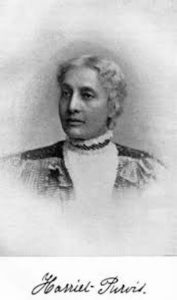
Harriet Purvis
*Harriet Purvis's birth is celebrated on this date in 1810. She was a Black abolitionist and first-generation suffragist.
Harriet Davy Forten was born in Philadelphia and was one of eight children of James Forten and Charlotte Vandine Forten, who lived at 92 Lombard Street. James Forten was a wealthy investor, businessman, and abolitionist born free. The Forten’s, a well-known Black family in the city, were noted for their gentility and hospitality. Many abolitionists who visited Philadelphia stayed in the Forten house.
The first country's biracial abolitionist organization, the Philadelphia Female Antislavery Society, was founded by Charlotte, her daughters, and Lucretia Mott. The Forten women were active members and officers. Her father established a private school with Grace Douglass. Harriet and her siblings attended the school and were taught foreign languages and music by private tutors. The girls Margaretta and Sarah were raised to be refined women. Abolitionist and poet John Greenleaf Whittier wrote a verse for Harriet, expressing his admiration for her. She was also said to have a Southern belle's ladylike demeanor and manners.
On September 13, 1831, Harriet Forten married Robert Purvis, a light-skinned Black abolitionist and antislavery lecturer from South Carolina. Early in their marriage, she had the couple's first child and, while pregnant, attended the Women's Antislavery Convention in New York in 1837 with two of her sisters. In 1838, the convention was held in Philadelphia. Robert Purvis helped his wife out of the carriage and angry people who looked on the thought that they were an interracial couple promoting "amalgamation" of the races. The hall was destroyed when it was set on fire by a group of people who were pro-slavery. The convention then convened at the teacher and abolitionist Sarah Pugh's school.
Black and white women participated almost as equals in the organization, which was rare then. It also generated reactions among people who feared a mixture of races or miscegenation and were generally concerned about women's intervention in public affairs. Not put off by the riot the previous year, Harriet attended the convention the following two years as a delegate at the 1838 and 1839 conventions. Unable to rent a hall in Philadelphia in 1839, the convention met at a riding stable. Purvis co-chaired Philadelphia Women's Antislavery Society fairs, which, between 1840 and 1861, raised $32,000 (equivalent to $983,424 in 2019). In 1841, the group rallied against excluding Black Sunday schools at Independence Square's annual Sunday School exhibition.
The following year, it was a biracial event. After the Thirteenth Amendment was passed, Purvis continued her efforts to improve the rights of African Americans. The Female Antislavery Society continued to meet in September 1866 to discuss the status of the South. Robert and Harriet became involved with the Pennsylvania State Equal Rights League and American Equal Rights Association and served on the executive committee. She spoke for the right to vote for women and blacks and against segregation.
Harriet, Robert, and Octavius Catto worked to desegregate streetcars in Philadelphia. This was done in conjunction with the Pennsylvania State Equal Rights League. In 1867, a state law was passed that provided equal access to public vehicles for all races. She also became involved in the Free Produce Society. Its members purchased local produce and boycotted produce grown and picked by slaves. Purvis, Lucretia Mott, and Sarah Pugh stayed true to their stance on free produce as a matter of principle. Author Carol Faulkner states that they "believed that hypocrisy threatened the success of their crusade."
Purvis was a member of the National Woman Suffrage Association and a friend of Susan B. Anthony and Lucretia Mott; they also worked for the right to vote for blacks and women, against slavery, and for the safe passage of refugee slaves. Harriet and her sister Margaretta Forten were key organizers of the Fifth National Woman's Rights Convention in Philadelphia in 1854. Harriet's daughter, Hattie, became the organization's first African American vice president. Harriet's sisters and Charlotte were also first-generation suffragists. Other Black women who worked for women's right to vote included Sojourner Truth, Amelia Shadd, Mary Ann Shadd Cary, Nancy Prince, and Frances Ellen Watkins Harper.
In 1873, Robert and Harriet moved to a Mount Vernon neighborhood with Georgianna and Harriet, who were still home. A series of illnesses beset the family. Three of their sons died, one from meningitis and the others from tuberculosis, which was the cause of Harriet's death on June 11, 1875, in Washington, D.C., where Robert worked as commissioner of Freedman’s Saving Bank and was buried in Germantown at the Quaker Fair Hill Burial Ground at 9th and Cambria. Two years after her death, a daughter died. Her husband married the Quaker poet Tacie Townsend, a white woman from Byberry.